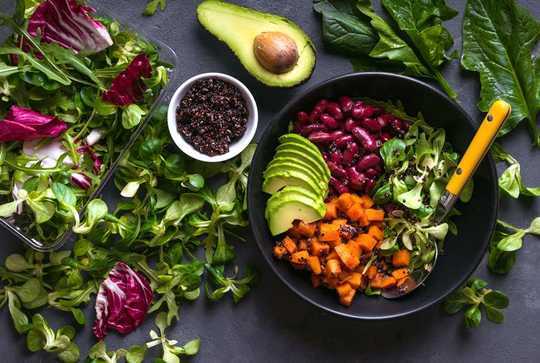
This is the first study to link a vegetarian diet to an increased risk of stroke. But the evidence isn’t strong enough to cause alarm. From shutterstock.com
A UK study finding vegetarianism is associated with a higher risk of stroke than a meat-eating diet has made headlines around the world.
The study, published in the British Medical Journal last week, found people who followed vegetarian or vegan diets had a 20% higher risk of having a stroke compared to those who ate meat.
Vegan and vegetarian diet could increase stroke risk, study says https://t.co/tytFzk2Qrz— Sky News (@SkyNews) September 5, 2019
But if you’re a vegetarian, there’s no need to panic. And if you’re a meat eater, these results don’t suggest you should eat more meat.
Get The Latest By Email
While we don’t fully understand why these results occurred, it’s important to note the study only showed an association between a vegetarian diet and increased stroke risk – not direct cause and effect.
What the study did and found
The researchers looked at 48,188 men and women living in Oxford, following what they ate, and whether they had heart disease or a stroke, over 18 years. The researchers grouped the participants according to their diets: meat eaters, fish eaters (pescatarians) and vegetarians (including vegans).
While vegan diets are quite different to vegetarian diets, the investigators combined these two groups as there were very small numbers of vegans in the study.
In their analysis, the researchers accounted for variables which are known risk factors for heart disease and stroke, including education level, smoking status, alcohol consumption, and physical activity.
They found vegetarians had a 22% lower risk of heart disease than meat eaters. This is equivalent to ten fewer cases of heart disease per 1,000 vegetarians than in meat eaters over ten years.
Yet the vegetarians had a 20% higher rate of stroke, equivalent to three more strokes per 1,000 vegetarians compared to the meat eaters over ten years.
The decrease in heart disease risk seemed to be linked to lower body mass index (BMI), cholesterol levels, incidence of diabetes, and blood pressure. These benefits are all known to be associated with a healthy vegetarian diet, and are protective factors against heart disease.
This study showed fish eaters (who did not consume meat) had a 13% lower risk of heart disease, but no significant increase in the rate of stroke when compared to meat eaters.
As with any study, there are strengths and weaknesses
The main strength of this study is that it closely followed a very large group of people over a long period of time.
The major weakness is that being an observational study, the researchers were not able to determine a cause and effect relationship.
So this study is not showing us vegetarian diets lead to increased risk of stroke; it simply tells us vegetarians have an increased risk of stroke. This means the association may be linked to other factors, aside from diet, which may be related to the lifestyle of a vegetarian.

The study’s authors suggest a difference in vitamin B12 levels between the vegetarian and meat-eating groups may have contributed to the results. From shutterstock.com
And while vegetarian and vegan diets may be seen as generally healthier, vegetarians still may be eating processed and ultra-processed foods. These foods can contain high levels of added salt, trans fat and saturated fats. This study did not report on the whole dietary pattern – just the major food groups.
Another major weakness of this study is that vegans and vegetarians were grouped together. Vegetarian and vegan diets can vary considerably in nutrient levels.
So why would the vegetarian group have a higher stroke risk?
These kind of observational studies are unable to provide what scientists call “a mechanism” – that is, a biological explanation as to why this association may exist.
But researchers will sometimes offer a potential biological explanation. In this case, they suggest the differences in nutrient intakes between the different diets may go some way to explaining the increased risk of stroke in the vegetarian group.
They cite a number of Japanese studies which have shown links between a very low intake of animal products and an increased risk of stroke.
One nutrient they mention is vitamin B12, as it’s found only in animal products (meat, fish, dairy products and eggs). Vegan sources are limited, though some mushroom varieties and fermented beans may contain vitamin B12.
Vitamin B12 deficiency can lead to anaemia and neurological issues, including numbness and tingling, and cognitive difficulties.
The authors suggest a lack of vitamin B12 may be linked to the increased risk of stroke among the vegetarian group. This deficiency could be present in vegetarians, and even more pronounced in vegans.
But this is largely speculative, and any associations between a low intake of animal products and an increased risk of stroke remain to be founded in a strong body of evidence. More research is needed before any recommendations are made.
What does this mean for vegetarians and vegans?
Vegetarians and vegans shouldn’t see this study as a reason to change their diets. This is the only study to date to have shown an increased risk of stroke with vegetarian or vegan diets.
Further, this study has shown overall greater benefits are gained by being vegetarian or vegan in its association with reduced risk of heart disease.
Meanwhile, other studies have shown meat eaters – particularly people who eat large amounts of red and processed meats – have higher risk of certain cancers.
Whether you’re an omnivore, pescatarian, vegetarian or vegan, it’s important to consider the quality of your diet. Focus on eating whole foods, and including lots of vegetables, fruits, cereals and grains.
It’s equally important to minimise the intake of processed foods high in added sugars, salt, saturated and trans fats. Diets high in these sorts of foods have well-established links to increased risk of heart disease and stroke. –Evangeline Mantzioris
Blind peer review
The analysis presents a fair and balanced assessment of the study, accurately pointing out that no meaningful recommendations can be drawn from the results. This is particularly so since the majority of the data was collected via self-reported questionnaires, which reduces the reliability of the results.
While in many cases the media has reported an increased stroke risk in vegetarians, total stroke risk was not actually statistically different between the groups. The researchers looked at two types of stroke: ischaemic stroke (where a blood vessel supplying blood to the brain is obstructed) and haemorrhagic stroke (where a blood vessel leaks or breaks).
A statistically significant increased risk in the vegetarian group was only seen in haemorrhagic stroke – and even there it’s marginal. Statistically, and in total numbers of people affected, the reduced heart disease risk in the vegetarian group is more convincing. –Andrew Carey![]()
About The Author
Evangeline Mantzioris, Program Director of Nutrition and Food Sciences, University of South Australia
This article is republished from The Conversation under a Creative Commons license. Read the original article.
books_food










